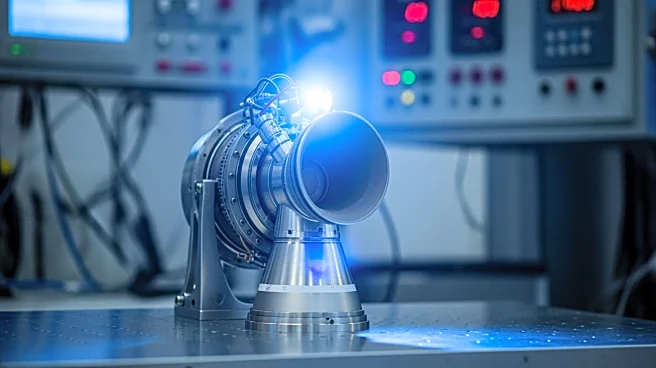What's Happening?
Firefly Aerospace Inc., a Texas-based space and defense technology company, has reported better-than-expected third-quarter results for 2025, leading to a surge in its stock price. The company announced
a significant increase in revenue, nearly doubling sequentially, and raised its full-year revenue guidance. Firefly also detailed plans to address the September ground-test failure of its Alpha rocket, which destroyed the first stage. Despite these positive developments, the company faces multiple shareholder lawsuits related to its August IPO and the test anomaly. Firefly's stock experienced a volatile rally, initially surging 18-22% in pre-market trading before settling at $18.31, near the bottom of its 52-week range.
Why It's Important?
The developments at Firefly Aerospace are significant for the U.S. space industry, as the company is positioning itself as a major player in space and defense technology. The raised revenue guidance and growing backlog, including contracts with NASA and the U.S. Space Force, indicate strong commercial traction. However, the company faces challenges, including legal issues and the need to execute its plans flawlessly to maintain investor confidence. The successful return to flight of the Alpha rocket is crucial for Firefly's reputation and future government contracts. The acquisition of SciTec further expands Firefly's capabilities in national security, potentially opening new markets.
What's Next?
Firefly Aerospace plans to return its Alpha rocket to flight between late 2025 and early 2026, using a different first stage from its production line. The company aims to conduct a static-fire test at Vandenberg Space Force Base in California before launching Alpha Flight 7. This launch is critical for Firefly, as it will carry a Lockheed Martin technology-demonstration payload. Additionally, Firefly's acquisition of SciTec positions it to pursue opportunities in the emerging 'Golden Dome' missile-defense architecture. The company must navigate shareholder lawsuits and demonstrate successful integration of SciTec to achieve its strategic goals.
Beyond the Headlines
Firefly Aerospace's situation highlights the complexities of investing in space technology companies, which often involve high risks and rewards. The company's focus on integrating hardware and software for defense applications reflects a broader trend in the industry towards vertical integration. The legal challenges stemming from the IPO and test failure underscore the importance of transparency and risk management in maintaining investor trust. As Firefly continues to expand its capabilities, it may influence the competitive landscape in the space and defense sectors, potentially driving innovation and collaboration among industry players.









